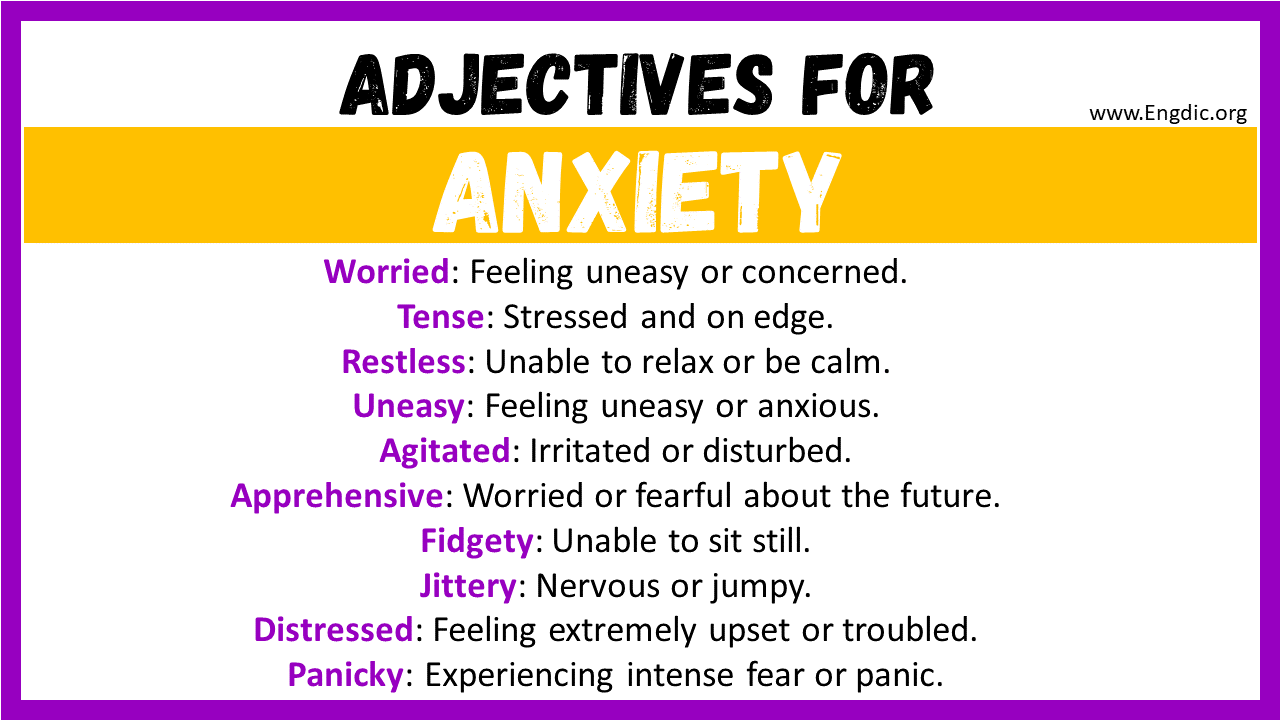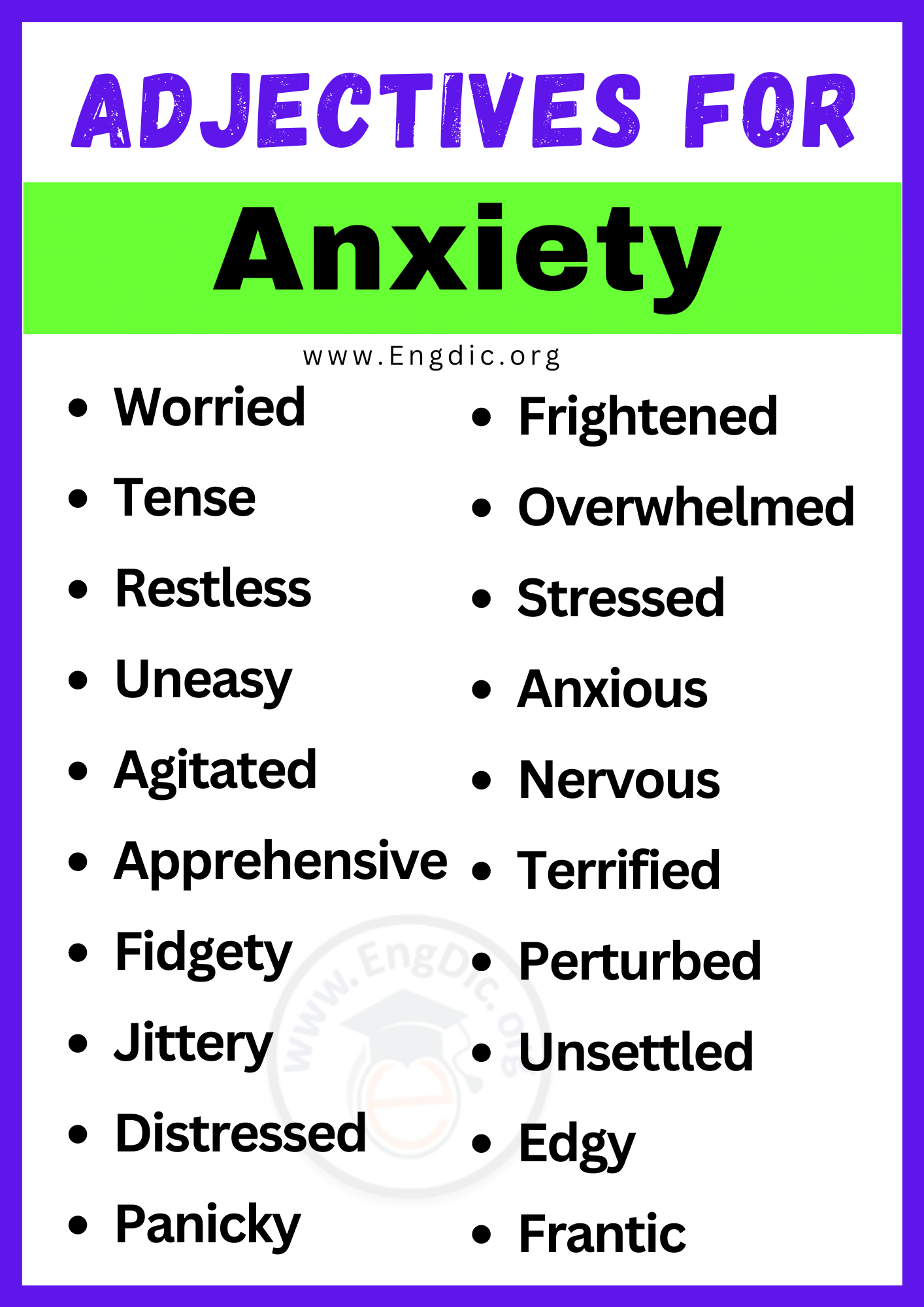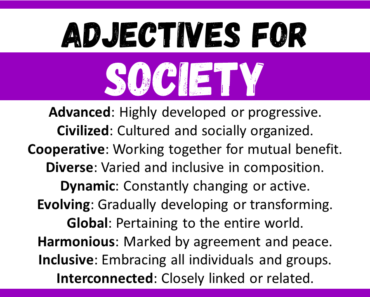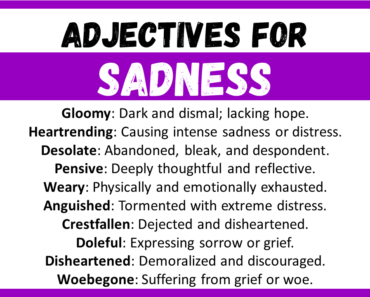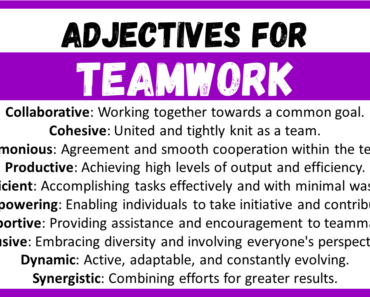Anxiety, a common emotion experienced by many, is often described as a feeling of unease, worry, or fear. It can manifest in various ways, affecting both our minds and bodies. When it comes to finding words to describe anxiety, a range of adjectives come to mind. From “nervous” and “apprehensive” to “panicky” and “overwhelmed,” these terms capture the intense and sometimes overwhelming nature of anxiety. Understanding and articulating these words can help us navigate and communicate our experiences, fostering empathy and support for those facing anxiety.
Adjectives for Anxiety
Here are the 20 Most Popular adjectives for anxiety:
- Worried
- Tense
- Restless
- Uneasy
- Agitated
- Apprehensive
- Fidgety
- Jittery
- Distressed
- Panicky
- Frightened
- Overwhelmed
- Stressed
- Anxious
- Nervous
- Terrified
- Perturbed
- Unsettled
- Edgy
- Frantic
Adjectives for Anxiety Disorder:
- Persistent
- Debilitating
- Chronic
- Crippling
- Overwhelming
- Paralyzing
- Distressing
- Intrusive
- Consuming
- Exhausting
Adjectives for Anxiety Attack:
- Intense
- Sudden
- Terrifying
- Rapid
- Overwhelming
- Debilitating
- Severe
- Unpredictable
- Heart-pounding
- Panic-inducing
Adjectives for Social Anxiety:
- Nervous
- Self-conscious
- Awkward
- Embarrassed
- Fearful
- Isolated
- Inhibited
- Avoidant
- Apprehensive
- Uncomfortable
Words to Describe Anxiety With Meanings
- Worried: Feeling uneasy or concerned.
- Tense: Stressed and on edge.
- Restless: Unable to relax or be calm.
- Uneasy: Feeling uneasy or anxious.
- Agitated: Irritated or disturbed.
- Apprehensive: Worried or fearful about the future.
- Fidgety: Unable to sit still.
- Jittery: Nervous or jumpy.
- Distressed: Feeling extremely upset or troubled.
- Panicky: Experiencing intense fear or panic.
- Frightened: Feeling scared or afraid.
- Overwhelmed: Feeling completely swamped or defeated.
- Stressed: Experiencing mental or emotional strain.
- Anxious: Feeling uneasy or worried.
- Nervous: Feeling uneasy or apprehensive.
- Terrified: Filled with extreme fear or terror.
- Perturbed: Annoyed or bothered.
- Unsettled: Not feeling calm or stable.
- Edgy: Nervous or irritable.
- Frantic: Wildly anxious or distressed.
Example Sentences for Anxiety Adjectives
- She was worried about her upcoming presentation.
- He felt tense before the important exam.
- The baby was restless and couldn’t sleep.
- I have an uneasy feeling about this situation.
- The constant noise made him agitated.
- She was apprehensive about the job interview.
- He couldn’t sit still and was fidgety.
- The caffeine made him feel jittery.
- The news left her feeling distressed.
- The sudden loud noise made everyone panicky.
- The horror movie left her frightened and trembling.
- Overwhelmed with work, he needed a break.
- The exam stress had left her feeling stressed.
- He was anxious about the upcoming flight.
- The public speaking made her nervous and shaky.
- She was terrified of spiders and screamed.
- The constant interruptions perturbed
- The recent events had left her feeling unsettled.
- The stressful situation made her feel edgy.
- He was running around frantically trying to find his lost keys.
Explore More Words:
FAQ’s
How to describe anxiety in writing?
Anxiety can be described as a gripping fear that tightens the chest and clouds the mind, making it hard to focus or find peace.
What is the word for extreme anxiety?
The word for extreme anxiety is “panic,” characterized by intense fear, rapid heartbeat, and a sense of impending doom.
What is a simile for anxiety?
A simile for anxiety could be “anxiety is like a dark cloud looming overhead, casting shadows of worry and unease.”
